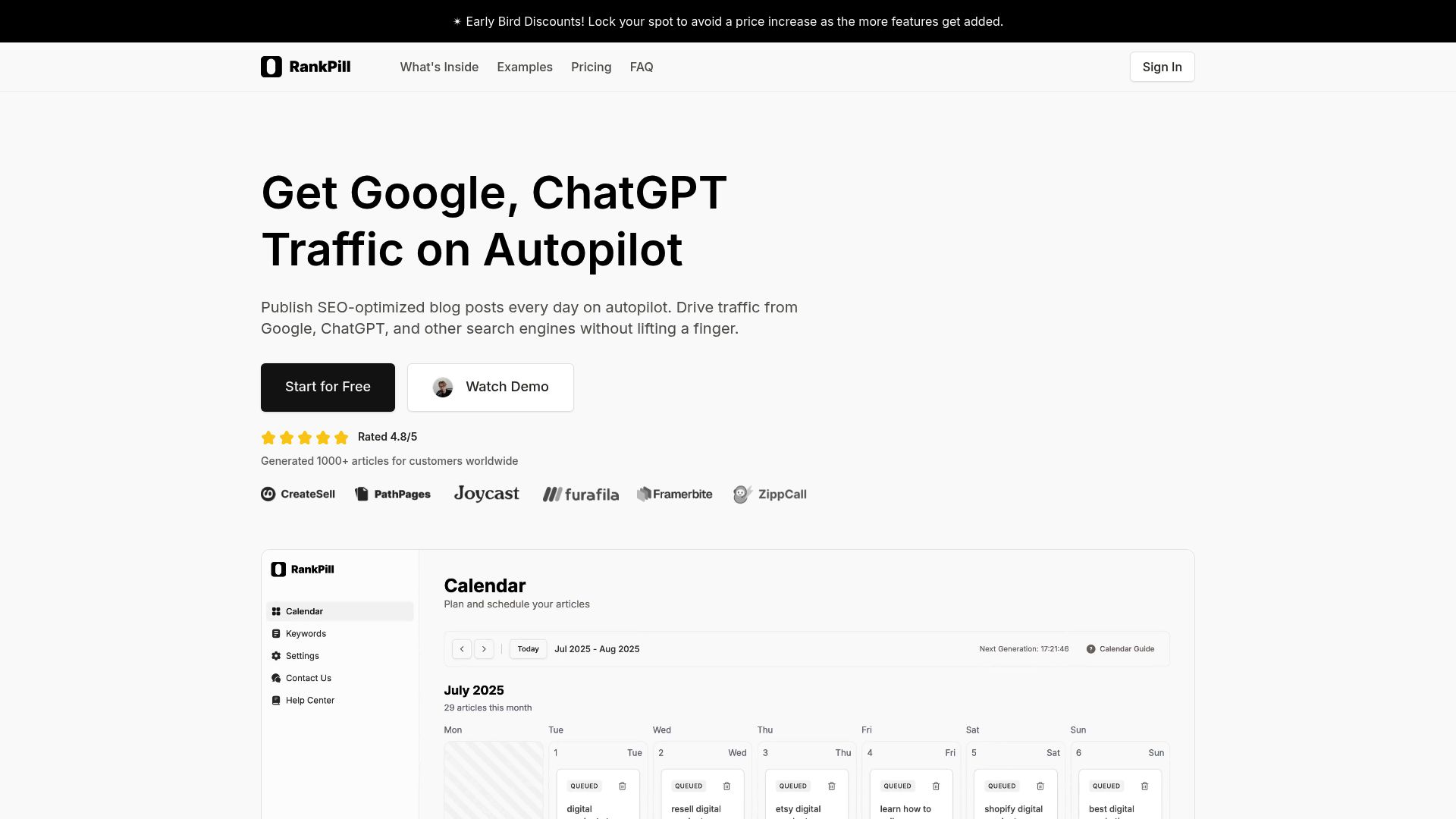Unlock the secrets to dominating Google rankings in 2025 without breaking the bank. Imagine discovering a roadmap that shows you how to grow your site using only free seo keyword research.
This guide is your key to the latest trends and strategies. You’ll learn why keyword research is more crucial than ever, how the SEO landscape is evolving for 2025, and the exact steps to uncover winning keywords.
Explore the best free tools, get actionable tips, and hear expert advice for long-term growth. Ready to boost your organic traffic with practical, up-to-date guidance? Let’s dive in.
Why Keyword Research Is Essential for SEO Success in 2025
In 2025, the digital landscape is evolving at lightning speed, and search engines remain the gateway to most online experiences. In fact, 68% of online journeys start with a search engine, confirming the critical role of visibility in organic growth. The rise of AI in search—think Google’s Search Generative Experience (SGE) and AI chat integration—means that free seo keyword research is now more crucial than ever. For a deeper dive, check out these SEO statistics and trends for 2025 that highlight just how fast the field is shifting.

The Changing Landscape of Keywords in 2025
Google’s algorithms are now powered by advanced AI, which means they interpret context, intent, and relationships between topics better than ever. Free seo keyword research isn’t just about finding the most-searched terms—it’s about spotting nuanced queries and understanding how AI ranks content. The introduction of AI-driven search features like ChatGPT integration is shifting the spotlight from broad, generic keywords to more specific, intent-driven phrases.
Featured snippets, People Also Ask boxes, and rich results now dominate the search results page. This means your keyword strategy must consider visibility beyond traditional rankings. Ignoring these shifts can leave your content buried, no matter how good it is.
Why Smart Keyword Targeting Matters More Than Ever
Not all keywords are created equal. High-competition keywords may look attractive but are often dominated by big brands with deep pockets. With free seo keyword research, you can uncover low-competition, high-value keywords that offer realistic ranking opportunities.
For example, a new blog targeting “best eco-friendly water bottles for kids” can outrank established brands by being specific and addressing user pain points. On the flip side, neglecting keyword research can lead to targeting phrases that drive little or no traffic—or attract the wrong audience entirely.
The Power of User Intent and Search Trends
Understanding user intent is the secret sauce for 2025. Free seo keyword research helps you identify what searchers truly want—whether it’s information, a product comparison, or a quick answer. Trends are also shifting rapidly; 15% of daily Google searches are brand new, so staying updated is essential.
Consider how “how to start a remote business in 2025” draws a different audience than just “start a business.” By aligning your keywords with intent and trends, you ensure your content is both visible and relevant.
Ongoing Keyword Research: Staying Ahead of the Curve
Search behaviors and algorithms are never static. The explosion of zero-click searches and featured snippets means users often find answers without clicking through to a website. Free seo keyword research must be an ongoing process—regularly updating your keyword lists, tracking performance, and adapting to new SERP features is essential.
Sites that continually refine their keyword strategies stay ahead, driving more organic traffic and building lasting authority. Treat your keyword research as a living, breathing part of your SEO game plan—one that evolves as fast as search itself.
The SEO Keyword Research Process: Step-by-Step Guide
Unlocking the full potential of free seo keyword research means following a structured process. By breaking it down into clear steps, anyone can uncover high-impact keywords and use them to drive real results. Let’s walk through the proven approach for 2025.

Step 1: Define Your Goals and Audience
Start your free seo keyword research by clarifying your SEO objectives. Are you aiming for more traffic, better quality leads, increased sales, or simply greater brand visibility? Defining these goals will shape how you approach every other step.
Next, identify your ideal audience. Use buyer personas and analytics to pinpoint their needs, pain points, and online behaviors. What questions are they asking? Where do they hang out online? For example, a B2B SaaS startup might focus on keywords that reflect decision-maker intent, such as “best CRM for small business.”
Aligning your content goals with your keyword strategy ensures every effort drives maximum ROI. Need more guidance on this foundational step? Check out these Free SEO strategies and tips to kickstart your research.
Step 2: Brainstorm Seed Keywords
With your goals in place, it’s time to brainstorm seed keywords—the core terms that define your niche. Begin by listing topics related to your products, services, or industry. Explore competitor websites, niche forums, and customer feedback for inspiration.
Don’t underestimate Google’s autocomplete and the “People Also Ask” sections. These features reveal real user questions and fresh keyword ideas daily. Remember, 15% of daily Google searches are brand new, so there’s always untapped potential.
Translate your product’s features into keyword ideas. For instance, if you offer project management software, consider terms like “task tracking,” “team collaboration,” or “deadline reminders.” This sets a solid foundation for expanding your free seo keyword research.
Step 3: Expand with Keyword Suggestions and Variations
After listing your seed keywords, use free tools to uncover variations and long-tail opportunities. Google Keyword Planner and Answer the Public are excellent for exploring related queries and synonyms. Long-tail keywords—specific, multi-word phrases—account for 70% of all search traffic.
Let’s say you run a hiking blog. Instead of just targeting “hiking boots,” try “best hiking boots for beginners” for a more precise audience. These specific phrases often have less competition and higher conversion rates.
By being thorough in your free seo keyword research, you’ll discover hidden gems that your competitors might miss. Specificity is your ally in 2025’s crowded search landscape.
Step 4: Analyze Search Volume, Difficulty, and Intent
Every keyword has unique search volume and competition levels. Use tools like Google Keyword Planner to check monthly search numbers and gauge difficulty. Focus on keywords with moderate search volume and low competition for quicker wins.
Competition analysis means looking at the top-ranking pages for your target keywords. Are they dominated by big brands or smaller sites? Assess user intent as well: is the searcher looking for information, to make a purchase, or to navigate somewhere specific?
For example, “how to start a blog” (informational) vs. “best blog hosting 2025” (commercial). Combining these insights ensures your free seo keyword research leads to realistic, high-potential targets.
Step 5: Prioritize and Organize Your Keyword List
Once you’ve gathered your data, organize your keywords into a master list. Segment them by topic, search intent, and where they fit in your marketing funnel. Use spreadsheets or free keyword management tools to keep everything tidy.
Identify quick-win opportunities—keywords you can rank for easily—as well as long-term targets that may require more effort. Build a content calendar around these priorities, ensuring each piece of content serves a clear purpose.
Remember, updating your keyword list is vital. Trends and search behaviors shift, so revisit your free seo keyword research quarterly to stay ahead. This proactive approach helps you maintain and grow your organic reach as algorithms evolve.
Step 6: Map Keywords to Content and Optimization Opportunities
The final step in your free seo keyword research process is to assign keywords to specific content pieces. For each page or post, select a primary keyword and a few secondary ones. Look for gaps in your existing content, and group related terms into clusters for pillar pages.
Use keywords strategically in your on-page SEO: weave them naturally into titles, headers, meta descriptions, and internal links. For example, a blog post about “remote work tips” could also target “productivity for remote teams” and “best remote collaboration tools.”
Pages that target three or more related keywords often rank for a wider range of queries. Regularly review and optimize your content map to ensure you’re making the most of your free seo keyword research.
The Best Free Keyword Research Tools for 2025
Looking to level up your free seo keyword research in 2025? The right tools can make or break your strategy, especially as search trends and algorithms keep evolving. The best part? You don’t need to break the bank—there are plenty of robust, no-cost options that deliver serious value. Let’s dive into the top free seo keyword research tools every marketer, blogger, and business owner should know about this year. For a broader comparison, you can also explore this Best Free SEO Keyword Research Tools 2025 guide.

Google Keyword Planner
Google Keyword Planner remains a cornerstone for free seo keyword research. Built into Google Ads, it provides reliable search volume, competition data, and keyword ideas directly from the source.
You can use it for organic SEO by filtering for non-branded, high-potential keywords. Set your language, region, and device preferences for even more targeted insights. While it’s designed for PPC, the data is invaluable for content strategy.
A quick tip: Use the filter function to uncover low-competition keywords that other free seo keyword research tools might miss. Keep in mind, though, that it often shows ranges instead of exact search volumes, and long-tail keyword data can be limited.
Google Trends
Google Trends is an essential companion for anyone serious about free seo keyword research. This tool lets you track keyword popularity and discover breakout topics in real time.
Spotting trends early means you can create timely content that rides the wave of rising interest. For example, in 2024, “AI content tools” saw a massive spike—savvy marketers who caught that trend early gained a serious edge.
Combine Google Trends with other free seo keyword research tools to see both the historical trajectory and the current buzz around your target queries. It’s especially powerful for identifying seasonal patterns and regional differences.
Answer the Public
Answer the Public takes free seo keyword research to a visual level. It maps out real user questions and search phrases, giving you a goldmine of long-tail keyword ideas and content inspiration.
You’ll see how people phrase their queries—“how,” “why,” “what,” and more—making it easy to align content with real user intent. Just enter a seed keyword, and get a web of questions and prepositions.
There’s a catch: the free tier only allows a few searches per day. Still, for brainstorming session or quick content planning, it’s an indispensable part of your free seo keyword research toolkit.
Keyword Surfer & Chrome Extensions
Browser extensions like Keyword Surfer have revolutionized free seo keyword research. As you browse Google, these plugins instantly display search volume, keyword ideas, and even domain-level data right on the results page.
This real-time overlay saves time and helps you make data-driven decisions on the fly. Imagine searching for “best SEO tools 2025” and seeing volume and suggestions without leaving your browser.
These tools are perfect for quick checks and spontaneous research. While not as deep as some platforms, they’re unbeatable for speed and convenience in your free seo keyword research workflow.
Ubersuggest (Free Version)
Ubersuggest by Neil Patel is a favorite for free seo keyword research, especially for beginners and small businesses. The free version offers keyword suggestions, search volume, and difficulty scores—all wrapped in a user-friendly interface.
You can export keyword lists, check competition, and see SERP overviews. This makes it easy to plan content calendars and track progress over time.
Note that the free plan has daily search limits. For most users, though, it’s a substantial upgrade over manual research and fits nicely into any free seo keyword research stack.
Other Notable Free Tools
Don’t overlook other strong contenders in free seo keyword research. Tools like Moz Keyword Explorer (free tier), SEMrush (limited free access), and Soovle each bring unique features to the table.
For deeper research, cross-reference keyword data across multiple tools. This helps validate search volume, competition, and intent—giving you a more accurate picture.
No single tool covers everything. By stacking several free seo keyword research tools, you can build a comprehensive, data-driven strategy without spending a dime.
How to Analyze and Select the Right Keywords in 2025
Choosing the right keywords is the heart of any successful free seo keyword research process. In 2025, analyzing and selecting keywords takes more than just looking at numbers—it requires understanding context, intent, and competition. Mastering this step ensures your content reaches the right audience and stands out in an AI-driven search landscape.
Interpreting Search Volume and Competition Metrics
When performing free seo keyword research, always start by examining monthly search volume and competition scores. Search volume shows how often people look for a term, while competition indicates how hard it is to rank. In 2025, these numbers reflect not just popularity, but changing user behaviors and AI-generated results.
Consider this quick comparison:
| Keyword | Search Volume | Competition | Opportunity |
|---|---|---|---|
| "SEO tools" | 10,000 | High | Tough |
| "free seo keyword research" | 800 | Medium | High |
| "best SEO tips 2025" | 1,200 | Low | Great |
A keyword with 800 searches might drive more targeted traffic than one with 10,000 if the competition is lower. Most new sites earn the majority of their visitors from low to medium volume phrases. Focus on balance—don’t chase only the biggest numbers.
Understanding User Intent and SERP Features
Effective free seo keyword research goes beyond numbers. You need to know why someone types a query and what they hope to find. Is the user looking for information, a product, or a specific site? Analyze the search engine results page (SERP) for clues: featured snippets, People Also Ask, and comparison tables all reveal intent.
For example, searching “best free keyword research tools” typically shows lists, reviews, and tool comparisons. If over half of searches end with no click, it’s often because Google answers the question directly. To stand out, target keywords where you can provide unique value, and structure your content to match SERP features.
List for intent analysis:
- Check top results: Are they guides, products, or definitions?
- Note if Google features snippets or answer boxes.
- Ask: What problem is the user solving?
Evaluating Keyword Difficulty and Ranking Potential
Keyword difficulty measures how challenging it is to rank for a term. Most free seo keyword research tools estimate this based on links, domain authority, and content quality. In 2025, even newer sites can win by targeting less competitive phrases.
Consider “AI SEO tools for small business” versus “SEO tools.” The first is more specific, with lower competition but high relevance. Remember, according to Ahrefs, 90% of pages get no Google traffic at all. Focus on attainable wins by picking keywords that fit your site’s strength and content depth.
To evaluate ranking potential:
- Review the top 10 results: Are they huge brands or smaller sites?
- Check backlink profiles if possible.
- Look for gaps in content quality or coverage.
Local and International Keyword Considerations
Free seo keyword research isn’t just about global terms. Local and international strategies matter more in 2025, as search engines personalize results by location and language. Use filters to discover how keywords perform in different regions.
For instance, “best pizza in Chicago” will have completely different competition and search volume than the broader “best pizza.” If your audience is multilingual, research keywords in each language. Data often varies dramatically by country, so tailor your approach for each target market.
Tips for local and international research:
- Use country/language filters in keyword tools.
- Compare search volume regionally.
- Analyze competitor sites in your specific market.
Advanced Free Keyword Research Strategies for 2025
Unlocking advanced strategies is essential for anyone serious about free seo keyword research in 2025. As search algorithms grow more sophisticated, leveraging innovative, free tactics can give you a competitive edge even if you’re on a budget.
Leveraging AI and Automation in Free Keyword Research
AI is transforming how we approach free seo keyword research. Today, free AI-powered tools can help you brainstorm keyword ideas, analyze SERPs, and generate content outlines in seconds. For example, ChatGPT can take your seed topics and instantly suggest dozens of long-tail keywords or common user questions.
Platforms like RankPill and other AI tools use automation for keyword clustering, competitor analysis, and content optimization. These solutions streamline research, saving hours while boosting accuracy. If you want to go deeper, check out this AI-powered keyword research guide for practical tips and free tool recommendations.
AI doesn’t just speed things up—it helps surface new opportunities that manual research might miss. Integrate these features into your workflow to stay ahead in 2025.
Competitor Keyword Gap Analysis Using Free Tools
One of the smartest ways to level up your free seo keyword research is by analyzing what your competitors rank for that you don’t. Free tools like Ubersuggest, Moz, and Google Search itself let you identify these “keyword gaps” without paying for expensive subscriptions.
Here’s how to get started:
- Search your primary competitors’ domains in a free keyword tool.
- Export their top-ranking keywords.
- Compare their list with yours to spot untapped opportunities.
For step-by-step methods and screenshots, explore this competitor keyword analysis methods guide.
Filling these gaps can boost your visibility fast, especially if you target long-tail phrases your competitors overlooked. This approach is vital for building a well-rounded free seo keyword research strategy.
Building Topical Authority with Keyword Clusters
Google’s algorithms now reward websites that organize content into clear, interconnected clusters around core topics. Instead of chasing individual keywords, group related terms into clusters and build pillar pages with supporting articles.
Here’s a quick comparison:
| Single Keyword Approach | Keyword Cluster Approach |
|---|---|
| “best running shoes” | “best running shoes,” “running shoes for flat feet,” “lightweight running shoes,” “trail running shoes” |
To implement this in your free seo keyword research:
- Map out main topics and subtopics.
- Use free tools to find related questions and variations.
- Link content pieces together to show topical depth.
A simple code block for grouping keywords:
Pillar Topic: Hiking Boots
- best hiking boots for beginners
- waterproof hiking boots reviews
- how to clean hiking boots
Sites with strong clusters tend to rank higher and attract more organic traffic in 2025.
Tracking Keyword Rankings and Performance for Free
Keeping tabs on your keyword rankings is crucial for measuring the success of your free seo keyword research efforts. Google Search Console is a must-have—it’s free and shows which queries drive clicks and impressions to your pages.
Other free options include browser plugins and limited-use tools like SERPWatcher. Here’s how to track performance:
- Monitor ranking changes weekly.
- Identify new keyword opportunities as they appear.
- Use data to update and expand your keyword targets.
By tracking results, you can pivot your strategy quickly and double down on what’s working.
How AI-Powered Platforms Like RankPill Automate Free Keyword Research and Content Creation
AI-powered platforms are revolutionizing free seo keyword research for businesses of all sizes. RankPill, for example, automates the entire process—generating personalized keyword lists, analyzing competitors, and producing SEO-optimized articles daily.

These tools can:
- Integrate images, videos, and internal/external links automatically.
- Support multiple languages for global reach.
- Save SMBs and startups countless hours by publishing consistent, high-quality content.
By making advanced automation accessible, RankPill helps democratize free seo keyword research, letting anyone compete with bigger brands in 2025.
Actionable Tips for Optimizing Content with Your Target Keywords
Ready to turn your free seo keyword research into higher rankings and real results? Let’s break down the most effective tactics for optimizing your content in 2025. Each step below is designed to help you make the most of your target keywords, boost visibility, and stay ahead of the SEO curve.
On-Page SEO Best Practices for 2025
To maximize the impact of your free seo keyword research, always incorporate your target keywords in key on-page elements. Focus on placing them in your page titles, headers (H1, H2, H3), meta descriptions, and URLs. This signals relevance to search engines and boosts your chances of ranking.
Use semantic keywords and related phrases naturally throughout your content. With AI-driven search algorithms evolving rapidly, it’s crucial to write for both humans and machines. Avoid keyword stuffing, which can harm readability and lower your rankings.
For example, compare two blog posts: one is well-structured, using semantic keywords and clean headers; the other is overloaded with repeated terms. The first consistently outranks the second in 2025. As AI continues to shape search behavior, staying up to date with AI's Role in SEO Practices helps you optimize smarter. Remember, effective on-page optimization is the foundation of free seo keyword research success.
Creating Content That Ranks—Beyond Keywords
Ranking in 2025 is about more than just inserting keywords. Align your content with search intent, offer depth, and ensure originality. Readers and search engines both prefer content that answers real questions and provides unique value.
Enhance your posts with visuals, videos, and rich media. For instance, a blog with images and an embedded video consistently outperforms text-only articles. Visual content not only increases engagement, but also signals quality to search engines.
When applying free seo keyword research, always map your keyword targets to specific user needs. The goal is to deliver comprehensive answers, not just match queries. This approach keeps your content competitive and relevant as search evolves.
Internal Linking and Content Structure
Strategic internal linking is essential for maximizing the value of your free seo keyword research. Build topic clusters by connecting related articles through anchor text that includes your target keywords. This helps distribute authority across your site and guides users to valuable resources.
For example, link your “SEO tools” guide to a post about “free seo keyword research” to boost visibility for both. Clear, interconnected structures make it easier for search engines to crawl and understand your content.
Google rewards sites with logical, well-organized internal links. As your content library grows, regularly audit your links to ensure every piece supports your overall SEO strategy and keyword goals.
Optimizing for Featured Snippets and Zero-Click Searches
Featured snippets and zero-click searches are now a major part of Google’s results page. To earn these spots, format your content with clear lists, tables, and direct answers to common questions.
For instance, if you’re targeting “free seo keyword research tools,” create a bullet list or table that summarizes your top recommendations. This increases your chances of being highlighted at the top of the search results.
Remember, featured snippets attract a large share of clicks. By optimizing for these formats, you leverage your free seo keyword research to capture more visibility—even when users don’t visit your site directly.
Regularly Refreshing and Expanding Keyword Targets
SEO is never set-and-forget. Make it a habit to revisit your content and update it with new keywords and fresh data uncovered through free seo keyword research. Trends shift rapidly, so staying agile is key.
Use tools like Google Search Console to spot new ranking opportunities and gaps. For guidance on monitoring your keyword positions, check out this detailed guide on how to check keyword rankings using free tools and techniques.
Refreshing your articles—like updating a 2022 guide to target “SEO in 2025”—keeps your site relevant and competitive. Ongoing optimization ensures your content continues to rank as search behavior and algorithms evolve.
Now that you know how powerful free keyword research can be for boosting your organic traffic in 2025, why not put these insights into action? With platforms like RankPill, you don’t have to spend hours juggling tools or second-guessing your strategy—we make it easy to automate keyword discovery and create content that gets results. If you’re ready to simplify your SEO, grow your audience, and stay ahead of the curve with AI-driven support, let’s take the next step together.
Get Started